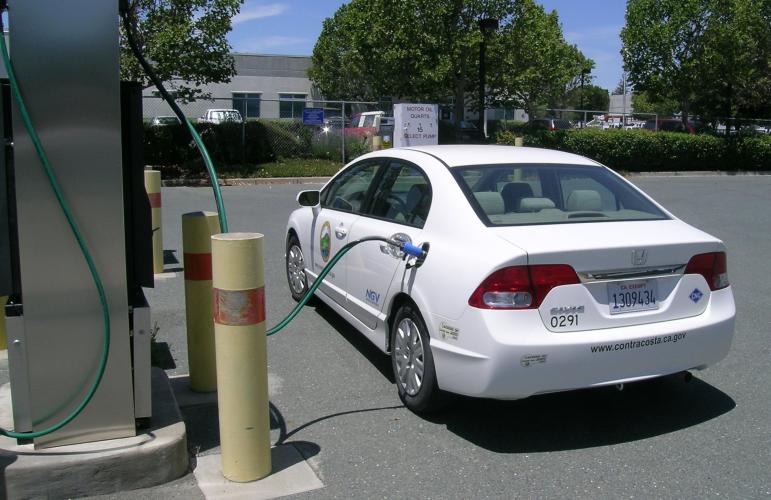Contra Costa County Greening Fleets
County: Contra Costa
Population: 170,310
Summary
Contra Costa County’s fleet consists of vehicles that use different alternative fuels, including bio-diesel and compressed natural gas (CNG), as well as hybrids and “flex-fuel” vehicles that can use gasoline and ethanol. The county’s fleet includes 112 flex-fuel vehicles, 140 hybrids, and 46 CNG fueled vehicles. Contra Costa County’s Alternate Fuel and Vehicle policy provides guidelines for using or buying alternate fuel vehicles and alternative fuels for county agencies. Implemented in 2003, the policy has resulted in the conversion of about 25 percent of the county’s fleet. The county has incorporated its alternative-fuel vehicle initiative into the Municipal Climate Action Plan it adopted in 2008.
Program Highlights
- Alternative-fuel or hybrid vehicles comprise about 25% of the county fleet.
- Alternative fuels used include bio-diesel, CNG, propane, and electric.
- The county shifted one of its three diesel-fuel stations to bio-diesel in 2006. All diesel vehicles in the fleet use bio-diesel when they refuel at this station.
- County has fueling facilities for bio-diesel and CNG and is planning to add an ethanol facility.
Lessons Learned
- A decision to purchase alternative-fuel vehicles requires consideration of a variety of factors. These include the purchase cost, fuel efficiency, cost and availability of fuel sources, level of emissions produced, and the availability and cost of service and repair facilities.
- Bio-diesel is comparable in cost to standard diesel, but produces lower emissions.
- Public safety “pursuit” vehicles that run on either ethanol or gasoline (known as “flex-fuel” vehicles) meet the same performance standards as pursuit vehicles that use only gasoline. However, flex-fuel vehicles operated on ethanol generally are 20-25 percent less fuel-efficient.
Resources to Learn More
- Contra Costa County Administrative Bulletin 508.2 (see PDF at right for download)
- Contra Costa County Department of General Services: (925) 313-7100
- Fleet Management Division (925) 313-7071
- Municipal Climate Action Plan
The Rest of the Story…
The Contra Costa County Alternate Fuel and Vehicle policy includes guidelines for consideration of alternate fuel vehicles and fuels for use or purchase by county agencies. The policy considers vehicles using compressed natural gas (CNG), electricity, fuel cells, or hybrids whenever possible. Implemented in 2003, the policy has spurred acquisition of hybrids, bio-diesel, and CNG fueled vehicles for the county fleet. The county has incorporated its alternative- fuel vehicle initiative into the Municipal Climate Action Plan it adopted in 2008.
While the county’s policy includes an exemption for emergency vehicles, the Sheriff Department uses many alternative-fuel vehicles, including hybrids for both administrative and undercover work. Additionally, the department uses several patrol and pursuit vehicles that run on either ethanol or gasoline (known as “flex-fuel” vehicles). When it evaluated the difference between regular and flex-fuel vehicles, the county found no difference in performance, but noted a 20-25% decrease in fuel economy while using E-85 ethanol.
In 2006, the county’s diesel vehicles began using bio-diesel and now use B-5 bio-diesel, which is diesel with at least 5 percent content from a biological source, such as soybeans. The switch required no modifications to the vehicles or fuel dispensing equipment other than more frequent fuel filter changes and a thorough scrubbing of the fuel storage tank before switching over to bio-diesel.
Contra Costa County has fueling facilities for bio-diesel, compressed natural gas, and plans to add ethanol facilities. To support the use of alternative-fuel vehicles more broadly, the county makes these fueling facilities available to other local public agency fleets.
Compiled May 2010
This case story was prepared with generous support from AAA Northern California, Nevada & Utah.


